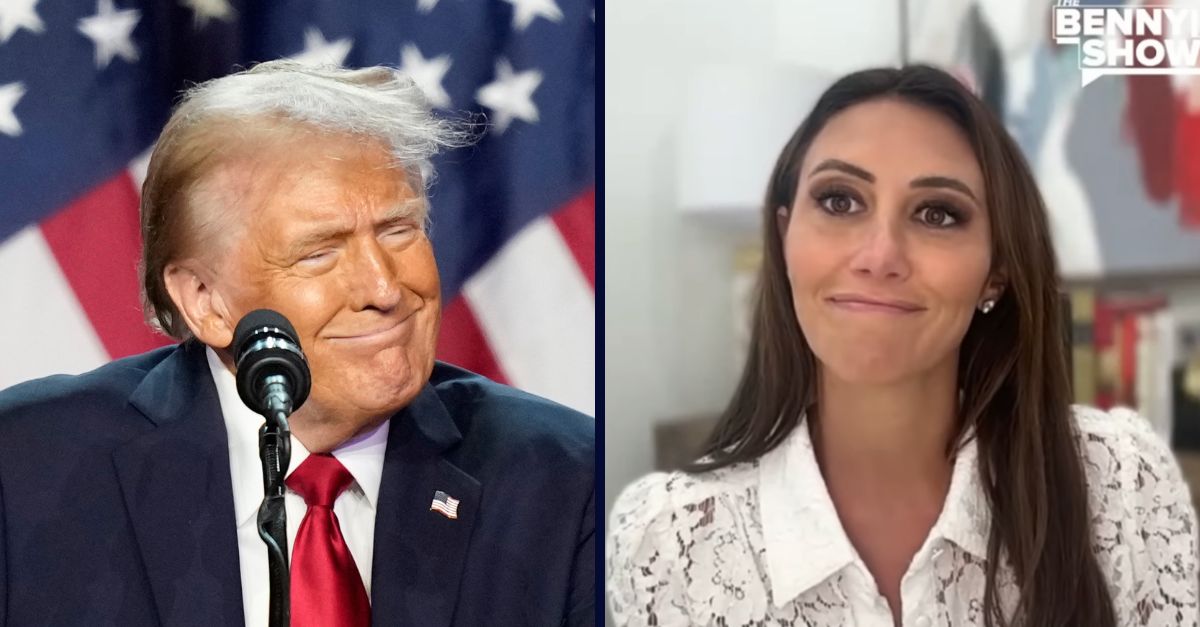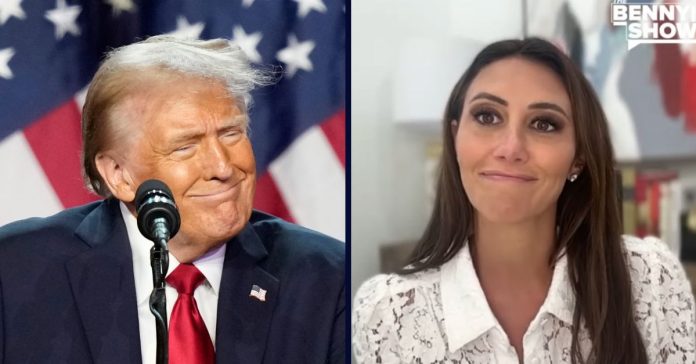
Left: Donald Trump speaks at an election night watch party, Wednesday, Nov. 6, 2024, in West Palm Beach, Fla. (AP Photo/Alex Brandon). Right: “Acting” U.S. Attorney Alina Habba speaking in an interview about federal judges voting against extending her term as New Jersey’s top prosecutor (The Benny Show/YouTube).
A day after the DOJ launched a full-throated defense of Alina Habba’s legitimacy as acting U.S. attorney in the Garden State, an advocacy organization for New Jersey criminal defense lawyers warned a federal judge that greenlighting the government’s “unconstitutional maneuvering” may only lead to more “mischief” — and might even impact “critical” appeals.
The Association of Criminal Defense Lawyers of New Jersey’s (ACDL-NJ) amicus brief argued in straightforward fashion that U.S. Attorney General Pam Bondi “did something unprecedented” to keep Habba, President Donald Trump’s former private attorney, in place.
As Law&Crime has reported, in order to keep Habba as acting U.S. attorney, Trump pulled her nomination to the permanent job and Habba resigned before her 120-day acting stint technically expired — but seemingly before her first assistant Desiree Leigh Grace’s appointment by a federal court as U.S. attorney became effective. Grace was then fired as first assistant and Habba was reinstalled to her ousted subordinate’s position under the Federal Vacancies Reform Act, making her, in effect, the top prosecutor in the office again.
At the same time, just in case the foregoing was legally invalid, Bondi named Habba a “Special Attorney to the United States Attorney General” under 28 U.S. Code § 515, a federal statute governing the commission of special attorneys, which gave her the power to supervise the whole office. And for good measure, Trump also fired Grace from the U.S. attorney position to which the N.J. federal court appointed her, to clear up any questions about whether the court’s appointment of Habba’s successor was effective.
This “convoluted method” and “novel order” from Bondi violates the Appointments Clause of the Constitution and sidestepped Congress, the brief said.
Love true crime? Sign up for our newsletter, The Law&Crime Docket, to get the latest real-life crime stories delivered right to your inbox
“The Appointments Clause provides Congress sole authority to define the offices that the President may fill and the method of their appointment. For U.S. Attorneys, Congress enacted detailed provisions delineating who may serve in the position on a permanent or acting capacity, and for how long,” the filing said. “It is inconceivable that Congress intended to empower the executive to sidestep its otherwise comprehensive statutes—and install whomever the President wants—in such a roundabout manner.”
The amicus urged Chief U.S. District Judge Matthew Brann, a Middle District of Pennsylvania jurist sitting by designation in criminal cases of Habba challengers Julien Giraud Jr. and Julien Giraud III, to “scrupulously enforce the statutes Congress passed with respect to the awesome position of U.S. Attorney—a unique office that wields great responsibilities for securing justice and protecting civil liberties—by concluding that Ms. Habba is barred from serving as the acting U.S. Attorney in this or any other case in the District of New Jersey.”
The brief said that Bondi’s move “also undermines another statute,” 28 U.S.C. § 545 — one that John Sarcone, a second acting U.S. attorney the AG reinstalled by the same means, has been accused of flouting.
The statute in most cases requires that “[e]ach United States attorney shall reside in the district for which he is appointed,” but if the court accepts Bondi’s “Special Attorney” designation, then Habba wouldn’t have to abide by it, said the brief.
“The government points out that Ms. Habba’s role as a Special-Attorney-delegated-authority-to-act-as-though-she-were-a-U.S.-Attorney means that no one needs to comply with this residency requirement,” the filing continued. “But that is a bug, not a feature. The upshot of the government’s delegation theory is that the executive can ignore the congressionally enacted residency requirement whenever it sees fit. It also means that the Attorney General has effectively confirmed herself as the U.S. Attorney for the District of New Jersey.”
The filing tacked on a footnote wondering if the government was aware that Habba’s N.J. “attorney registration represents that her employer is ‘OUT OF STATE’ in Washington, DC.”
“If the Court does not put a stop to this unconstitutional maneuvering, further mischief could lie ahead,” the brief warned.
Casting Bondi’s “approach” as “imperial,” the amicus stated that the “dubious delegation theory” the AG relied on to override a federal court’s appointment of Habba’s successor, her former first assistant Grace, could end up harming the government when it comes time for “critical” appeals related to evidence.
“Federal law provides that the government can appeal adverse decisions involving the suppression or exclusion of evidence or requiring the government to return seized property only where ‘the United States attorney certifies to the district court that the appeal is not taken for purpose of delay and that the evidence is a substantial proof of a fact material in the proceeding,'” said the brief disputing Habba’s legitimacy as acting U.S. attorney.
If the government were so concerned about the administration of justice, then it wouldn’t contort itself to keep a political ally in a position that could jeopardize appeals in criminal cases, the amicus continued.
“Even the Attorney General’s say-so would not comply with the statute. If the government were truly committed to safeguarding the continued functioning of federal prosecutorial power in New Jersey and to avoid ‘crippling’ interruptions, it is hard to imagine that it would take a step that jeopardizes its ability to appeal adverse judicial decisions,” the filing said.
Brann previously allowed the ACDL-NJ to file its amicus brief and participate in oral arguments set to take place at 10 a.m. on Friday. Unfortunately, the judge’s chambers told Law&Crime there will not be a public access line to listen in on the arguments remotely, as the Girauds’ case is a criminal proceeding.
It won’t just be the Giraud defendants and their attorneys making arguments against Habba’s authority at the hearing. Brann has consolidated a second challenge, one brought by Cesar Pina — a fraud defendant who, unlike the Girauds, was indicted on Habba’s watch.
Recall that Brann, while still entertaining whether to effectively force Habba’s recusal in pending criminal cases, refused to dismiss the Girauds’ drug-trafficking indictment, rejecting the notion that Habba’s questionable authority to serve as N.J.’s top federal prosecutor “somehow retroactively taint[ed]” a criminal case brought by a different and Senate-confirmed U.S. attorney, Philip Sellinger.
The judge has allowed Pina, represented by attorneys Norm Eisen, Abbe Lowell and Gerald Krovatin, to raise his dismissal arguments at the hearing.

